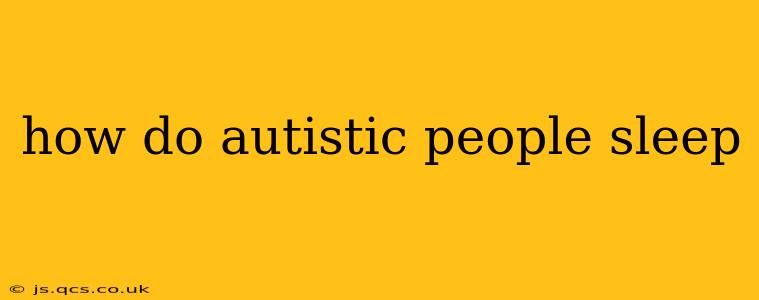Sleep disturbances are common among autistic individuals, impacting their quality of life and overall well-being. While not every autistic person experiences sleep problems, a significant portion faces unique challenges compared to neurotypical individuals. This article delves into the complexities of sleep in autism, exploring common difficulties and offering potential strategies for improvement.
What are the Common Sleep Problems Experienced by Autistic People?
Many autistic individuals report difficulties with sleep onset, maintenance, and overall sleep quality. These challenges often stem from sensory sensitivities, anxiety, and differences in neurological functioning. Some common sleep problems include:
- Insomnia: Difficulty falling asleep or staying asleep. This can be due to racing thoughts, anxiety, or discomfort from sensory overload.
- Sleep Apnea: This condition involves pauses in breathing during sleep, leading to fragmented sleep and daytime tiredness. While not exclusive to autism, it's more prevalent in some autistic individuals.
- Delayed Sleep Phase Syndrome (DSPS): A circadian rhythm disorder characterized by a later-than-usual sleep-wake cycle. Autistic individuals may naturally have a later bedtime and wake-up time.
- Restless Legs Syndrome (RLS): An irresistible urge to move the legs, often accompanied by uncomfortable sensations. This can significantly disrupt sleep.
Why Do Autistic People Have Trouble Sleeping?
The reasons behind sleep disturbances in autistic individuals are multifaceted and interconnected. Here are some key factors:
- Sensory Sensitivities: Over- or under-sensitivity to light, sound, touch, temperature, and smell can make it difficult to fall asleep and stay asleep. Even seemingly minor stimuli can be intensely disruptive.
- Anxiety and Stress: Autistic individuals may experience higher levels of anxiety and stress, which can manifest as racing thoughts and difficulty relaxing before bed. This is exacerbated by social pressures and potential challenges navigating daily life.
- Difficulties with Routine and Predictability: The need for routine and predictability is common among autistic individuals. Any disruption to their established routines can lead to anxiety and sleep disturbances.
- Gastrointestinal Issues: Many autistic individuals have gastrointestinal problems, such as constipation or irritable bowel syndrome (IBS), which can cause discomfort and interfere with sleep.
- Mental Health Conditions: Co-occurring conditions like ADHD, anxiety disorders, and depression are more prevalent in autistic individuals and can significantly impact sleep.
How Can Autistic People Improve Their Sleep?
Improving sleep for autistic individuals requires a holistic approach, focusing on addressing underlying sensory sensitivities, anxiety, and routine disruptions. Here are some strategies that can help:
- Create a Relaxing Bedtime Routine: Establish a consistent bedtime routine involving calming activities such as warm baths, reading, listening to calming music, or practicing mindfulness techniques.
- Optimize the Sleep Environment: Create a dark, quiet, and cool sleep environment. Consider using blackout curtains, earplugs, or a white noise machine to minimize sensory distractions. Weighted blankets can also be helpful for some individuals.
- Address Sensory Sensitivities: Identify and mitigate sensory triggers that disrupt sleep. This may involve adjusting the room temperature, using specific bedding materials, or wearing comfortable clothing.
- Manage Anxiety: Practice relaxation techniques, such as deep breathing exercises, meditation, or yoga, to reduce anxiety before bed. Consider professional support for managing anxiety if needed.
- Maintain a Consistent Sleep Schedule: Go to bed and wake up around the same time each day, even on weekends, to regulate the body's natural sleep-wake cycle.
- Seek Professional Help: If sleep problems persist, consult a healthcare professional or sleep specialist. They can help identify underlying medical conditions and recommend appropriate treatment options, such as medication or therapy.
What are Some Helpful Tools and Techniques for Autistic People with Sleep Problems?
Beyond the strategies already discussed, several tools and techniques can specifically assist autistic individuals struggling with sleep:
- Weighted Blankets: The gentle pressure provided by weighted blankets can be calming and promote relaxation.
- White Noise Machines: These machines mask disruptive sounds and create a more consistent auditory environment.
- Melatonin Supplements: Melatonin is a hormone that regulates sleep, and supplements may be helpful for some individuals. However, it's essential to consult a doctor before using melatonin supplements.
- Cognitive Behavioral Therapy for Insomnia (CBT-I): This type of therapy can help individuals identify and change negative thoughts and behaviors that contribute to insomnia.
- Sensory Integration Therapy: This therapy focuses on improving the way the nervous system processes sensory information, potentially reducing sensory sensitivities that interfere with sleep.
Are there specific sleep disorders more common in autistic people?
While not exclusively found in autistic individuals, certain sleep disorders seem to occur more frequently. These include sleep apnea, restless legs syndrome, and delayed sleep phase syndrome. The underlying reasons often intertwine with the sensory sensitivities and anxiety commonly experienced within the autistic community. Accurate diagnosis is crucial for appropriate management.
How can parents help autistic children who struggle with sleep?
Parents play a crucial role in supporting autistic children experiencing sleep challenges. Establishing consistent routines, optimizing the sleep environment, addressing sensory issues, and seeking professional help when necessary are essential steps. Patience and understanding are crucial in fostering a calm and supportive environment that promotes healthy sleep habits.
This comprehensive guide aims to shed light on the complexities of sleep in autism. Remember that every autistic individual is unique, and what works for one person may not work for another. The key is to identify individual needs and develop a personalized approach to improve sleep quality and overall well-being. If you or someone you know is experiencing significant sleep difficulties, seeking professional help is always recommended.
